新概念-第二册第2课
- 格式:ppt
- 大小:1.89 MB
- 文档页数:24
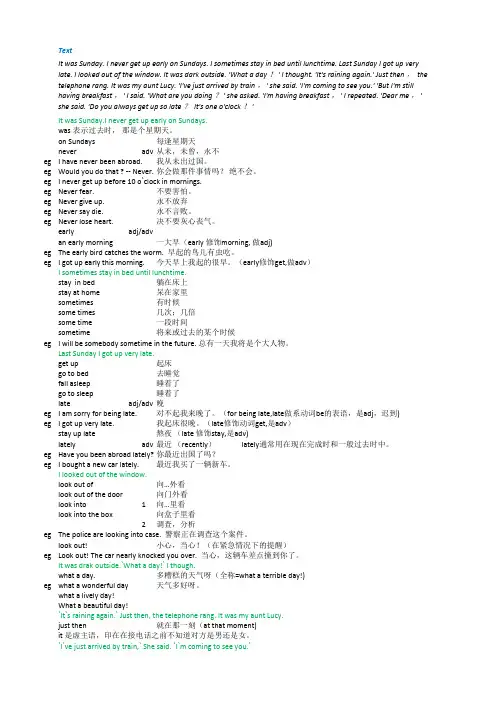
TextIt was Sunday. I never get up early on Sundays. I sometimes stay in bed until lunchtime. Last Sunday I got up very late. I looked out of the window. It was dark outside. 'What a day!' I thought. 'It's raining again.' Just then, the telephone rang. It was my aunt Lucy. 'I've just arrived by train,' she said. 'I'm coming to see you.' 'But I'm still having breakfast,' I said. 'What are you doing?' she asked. 'I'm having breakfast,' I repeated. 'Dear me,' she said. 'Do you always get up so late? It's one o'clock!'It was Sunday.I never get up early on Sundays.was 表示过去时,那是个星期天。
on Sundays每逢星期天never adv从未,未曾,永不eg I have never been abroad.我从未出过国。
eg Would you do that ? -- Never.你会做那件事情吗?绝不会。
eg I never get up before 10 o`clock in mornings.eg Never fear.不要害怕。
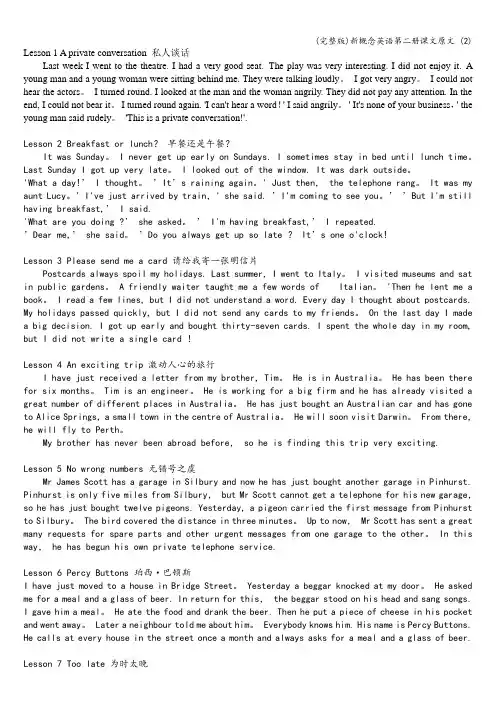
Lesson 1 A private conversation 私人谈话Last week I went to the theatre. I had a very good seat. The play was very interesting. I did not enjoy it. A young man and a young woman were sitting behind me. They were talking loudly。
I got very angry。
I could not hear the actors。
I turned round. I looked at the man and the woman angrily. They did not pay any attention. In the end, I could not bear it。
I turned round again. 'I can't hear a word!' I said angrily。
' It's none of your business,' the young man said rudely。
'This is a private conversation!'.Lesson 2 Breakfast or lunch?早餐还是午餐?It was Sunday。
I never get up early on Sundays. I sometimes stay in bed until lunch time。
Last Sunday I got up very late。
I looked out of the window. It was dark outside。
'What a day!’ I thought。
’It’s raining again。
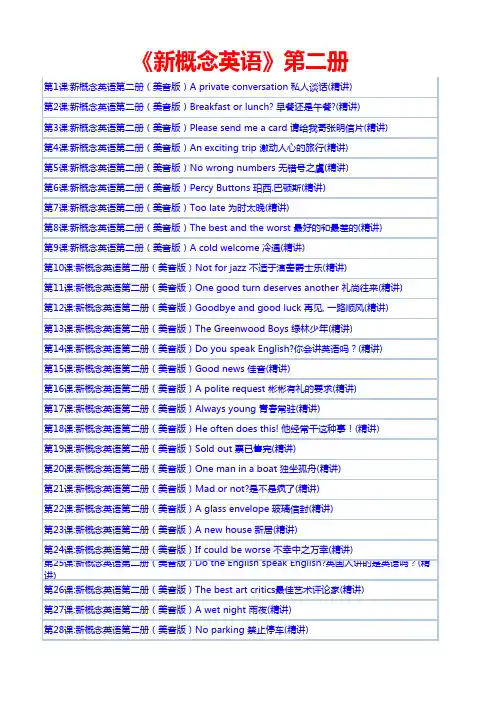
《新概念英语》第二册第1课:新概念英语第二册(美音版)A private conversation 私人谈话(精讲)第2课:新概念英语第二册(美音版)Breakfast or lunch? 早餐还是午餐?(精讲)第3课:新概念英语第二册(美音版)Please send me a card 请给我寄张明信片(精讲)第4课:新概念英语第二册(美音版)An exciting trip 激动人心的旅行(精讲)第5课:新概念英语第二册(美音版)No wrong numbers 无错号之虞(精讲)第6课:新概念英语第二册(美音版)Percy Buttons 珀西.巴顿斯(精讲)第7课:新概念英语第二册(美音版)Too late 为时太晚(精讲)第8课:新概念英语第二册(美音版)The best and the worst 最好的和最差的(精讲)第9课:新概念英语第二册(美音版)A cold welcome 冷遇(精讲)第10课:新概念英语第二册(美音版)Not for jazz 不适于演奏爵士乐(精讲)第11课:新概念英语第二册(美音版)One good turn deserves another 礼尚往来(精讲)第12课:新概念英语第二册(美音版)Goodbye and good luck 再见, 一路顺风(精讲)第13课:新概念英语第二册(美音版)The Greenwood Boys 绿林少年(精讲)第14课:新概念英语第二册(美音版)Do you speak English?你会讲英语吗?(精讲)第15课:新概念英语第二册(美音版)Good news 佳音(精讲)第16课:新概念英语第二册(美音版)A polite request 彬彬有礼的要求(精讲)第17课:新概念英语第二册(美音版)Always young 青春常驻(精讲)第18课:新概念英语第二册(美音版)He often does this! 他经常干这种事!(精讲)第19课:新概念英语第二册(美音版)Sold out 票已售完(精讲)第20课:新概念英语第二册(美音版)One man in a boat 独坐孤舟(精讲)第21课:新概念英语第二册(美音版)Mad or not?是不是疯了(精讲)第22课:新概念英语第二册(美音版)A glass envelope 玻璃信封(精讲)第23课:新概念英语第二册(美音版)A new house 新居(精讲)第24课:新概念英语第二册(美音版)If could be worse 不幸中之万幸(精讲)第25课:新概念英语第二册(美音版)Do the English speak English?英国人讲的是英语吗?(精讲)第26课:新概念英语第二册(美音版)The best art critics最佳艺术评论家(精讲)第27课:新概念英语第二册(美音版)A wet night 雨夜(精讲)第28课:新概念英语第二册(美音版)No parking 禁止停车(精讲)第29课:新概念英语第二册(美音版)Taxi! 出租汽车(精讲)第30课:新概念英语第二册(美音版)Football or polo? 足球还是水球?(精讲)第31课:新概念英语第二册(美音版)Success story 成功者的故事(精讲)第32课:新概念英语第二册(美音版)Shopping made easy 购物变得很方便(精讲)第33课:新概念英语第二册(美音版)Out of the darkness 冲出黑暗(精讲)第34课:新概念英语第二册(美音版)Quick work 破案 “神速”(精讲)第35课:新概念英语第二册(美音版)Stop thief!捉贼!(精讲)第36课:新概念英语第二册(美音版)Across the Channel 横渡海峡(精讲)第37课:新概念英语第二册(美音版)The Olympic Games 奥林匹克运动会(精讲)第38课:新概念英语第二册(美音版)Everything except the weather 唯独没有考虑到天气(精讲第39课:新概念英语第二册(美音版)Am I all right? 我是否痊愈?(精讲)第40课:新概念英语第二册(美音版)Food and talk 进餐与交谈(精讲)第41课:新概念英语第二册(美音版)Do you call that a hat? 你把那个叫帽子吗?(精讲)第42课:新概念英语第二册(美音版)Not very musical 并非很懂音乐(精讲)第43课:新概念英语第二册(美音版)Over the South Pole 飞越南极(精讲)第44课:新概念英语第二册(美音版)Through the forest 穿过森林(精讲)第45课:新概念英语第二册(美音版)A clear conscience 问心无愧(精讲)第46课:新概念英语第二册(美音版)Expensive and uncomfortable 既昂贵又受罪(精讲)第47课:新概念英语第二册(美音版)A thirsty ghost 嗜酒的鬼魂(精讲)第48课:新概念英语第二册(美音版)Did you want to tell me something? 你想对我说什么吗?第49课:新概念英语第二册(美音版)The end of a dream 美梦告终(精讲)第50课:新概念英语第二册(美音版)Taken for a ride 乘车兜风(精讲)第51课:新概念英语第二册(美音版)Reward for virtue 对美德的奖赏(精讲)第52课:新概念英语第二册(美音版)A pretty carpet 漂亮的地毯(精讲)第53课:新概念英语第二册(美音版)Hot snake 触电的蛇(精讲)第54课:新概念英语第二册(美音版)Sticky fingers 粘糊的手指(精讲)第55课:新概念英语第二册(美音版)Not a gold mine 并非金矿(精讲)第56课:新概念英语第二册(美音版)Faster than sound! 比声音还快!(讲解)第57课:新概念英语第二册(美音版)Can I help you, madam? 您要买什么,夫人?(精讲)第58课:新概念英语第二册(美音版)A blessing in disguise? 是因祸得福吗?(精讲)第59课:新概念英语第二册(美音版)In or out? 进来还是出去?(精讲)第60课:新概念英语第二册(美音版)The future 卜算未来(精讲)第61课:新概念英语第二册(美音版)Trouble with the Hubble 哈勃望远镜的困境(讲解)第62课:新概念英语第二册(美音版)After the fire 大火之后(精讲)第63课:新概念英语第二册(美音版)She was not amused 她并不觉得好笑(精讲)第64课:新概念英语第二册(美音版)The Channel Tunnel 海峡隧道(精讲)第65课:新概念英语第二册(美音版)Jumbo versus the police 小象对警察(精讲)第66课:新概念英语第二册(美音版)Sweet as honey! 像蜜一样甜!(精讲)第67课:新概念英语第二册(美音版)Volcanoes 火山(精讲)第68课:新概念英语第二册(美音版)Persistent 纠缠不休(精讲)第69课:新概念英语第二册(美音版)But not murder!并非谋杀!(精讲)第70课:新概念英语第二册(美音版)Red for danger 危险的红色(精讲)第71课:新概念英语第二册(美音版)A famous clock第72课:新概念英语第二册(美音版)A car called bluebird第73课:新概念英语第二册(美音版)The record-holder第74课:新概念英语第二册(美音版)Out of the limelight第75课:新概念英语第二册(美音版)SOS第76课:新概念英语第二册(美音版)April Fools Day第77课:新概念英语第二册(美音版)A successful operation第78课:新概念英语第二册(美音版)The last one?第79课:新概念英语第二册(美音版)By air第80课:新概念英语第二册(美音版)The Crystal Palace第81课:新概念英语第二册(美音版)Escape第82课:新概念英语第二册(美音版)Monster or fish?第83课:新概念英语第二册(美音版)After the elections第84课:新概念英语第二册(美音版)On strike第85课:新概念英语第二册(美音版)Never too old to learn第86课:新概念英语第二册(美音版)Out of control第87课:新概念英语第二册(美音版)A perfect alibi第88课:新概念英语第二册(美音版)Trapped in a mine第89课:新概念英语第二册(美音版)A slip of the tongue 第90课:新概念英语第二册(美音版)What第91课:新概念英语第二册(美音版)Three men in a basket 第92课:新概念英语第二册(美音版)Asking for trouble第93课:新概念英语第二册(美音版)A noble gift第94课:新概念英语第二册(美音版)Future champions第95课:新概念英语第二册(美音版)A fantasy第96课:新概念英语第二册(美音版)The dead return。
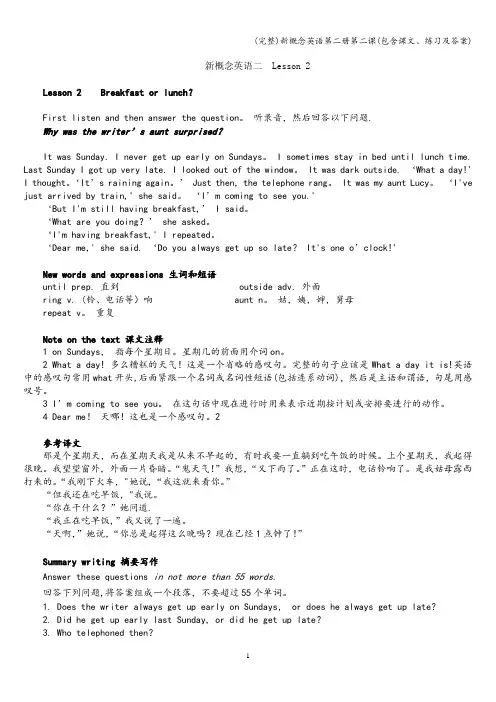
新概念英语二 Lesson 2Lesson 2 Breakfast or lunch?First listen and then answer the question。
听录音,然后回答以下问题.Why was the writer’s aunt surprised?It was Sunday. I never get up early on Sundays。
I sometimes stay in bed until lunch time. Last Sunday I got up very late. I looked out of the window。
It was dark outside. ‘What a day!' I thought。
‘It’s raining again。
’ Just then, the telephone rang。
It was my aunt Lucy。
‘I've just arrived by train,' she said。
‘I’m coming to see you.'‘But I'm still havi ng breakfast,’ I said。
‘What are you doing?’ she asked。
‘I'm having breakfast,' I repeated。
‘Dear me,' she said. ‘Do you always get up so late?It's one o’clock!'New words and expressions 生词和短语until prep. 直到 outside adv. 外面ring v. (铃、电话等)响 aunt n。
姑,姨,婶,舅母repeat v。
重复Note on the text 课文注释1 on Sundays,指每个星期日。
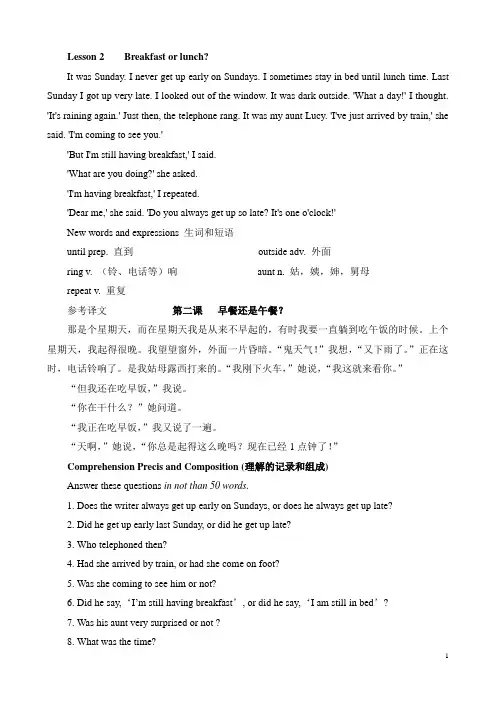
Lesson 2 Breakfast or lunch?It was Sunday. I never get up early on Sundays. I sometimes stay in bed until lunch time. Last Sunday I got up very late. I looked out of the window. It was dark outside. 'What a day!' I thought. 'It's raining again.' Just then, the telephone rang. It was my aunt Lucy. 'I've just arrived by train,' she said. 'I'm coming to see you.''But I'm still having breakfast,' I said.'What are you doing?' she asked.'I'm having breakfast,' I repeated.'Dear me,' she said. 'Do you always get up so late? It's one o'clock!'New words and expressions 生词和短语until prep. 直到outside adv. 外面ring v. (铃、电话等)响aunt n. 姑,姨,婶,舅母repeat v. 重复参考译文第二课早餐还是午餐?那是个星期天,而在星期天我是从来不早起的,有时我要一直躺到吃午饭的时候。
上个星期天,我起得很晚。
我望望窗外,外面一片昏暗。
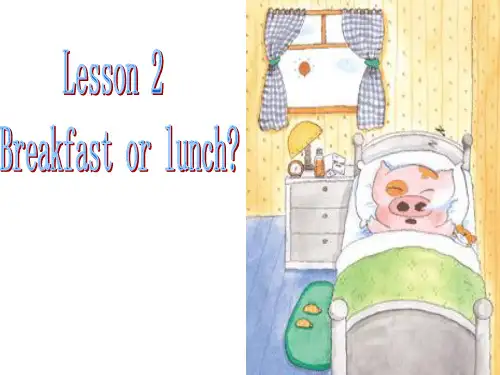
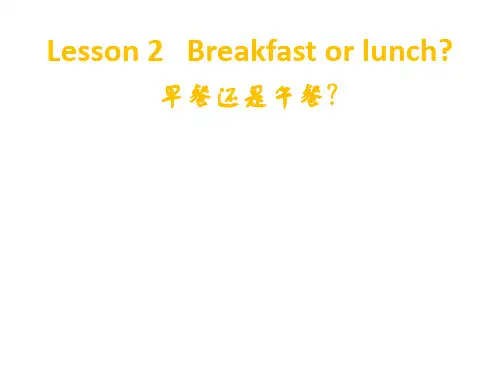
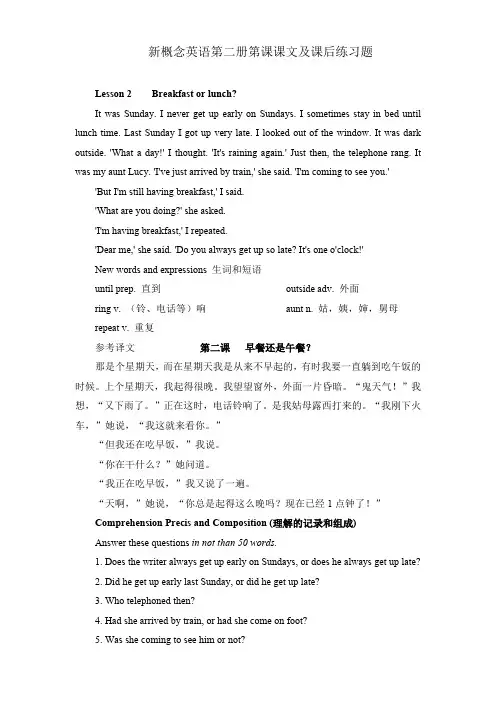
新概念英语第二册第课课文及课后练习题Lesson 2 Breakfast or lunch?It was Sunday. I never get up early on Sundays. I sometimes stay in bed until lunch time. Last Sunday I got up very late. I looked out of the window. It was dark outside. 'What a day!' I thought. 'It's raining again.' Just then, the telephone rang. It was my aunt Lucy. 'I've just arrived by train,' she said. 'I'm coming to see you.' 'But I'm still having breakfast,' I said.'What are you doing?' she asked.'I'm having breakfast,' I repeated.'Dear me,' she said. 'Do you always get up so late? It's one o'clock!'New words and expressions 生词和短语until prep. 直到outside adv. 外面ring v. (铃、电话等)响aunt n. 姑,姨,婶,舅母repeat v. 重复参考译文第二课早餐还是午餐?那是个星期天,而在星期天我是从来不早起的,有时我要一直躺到吃午饭的时候。
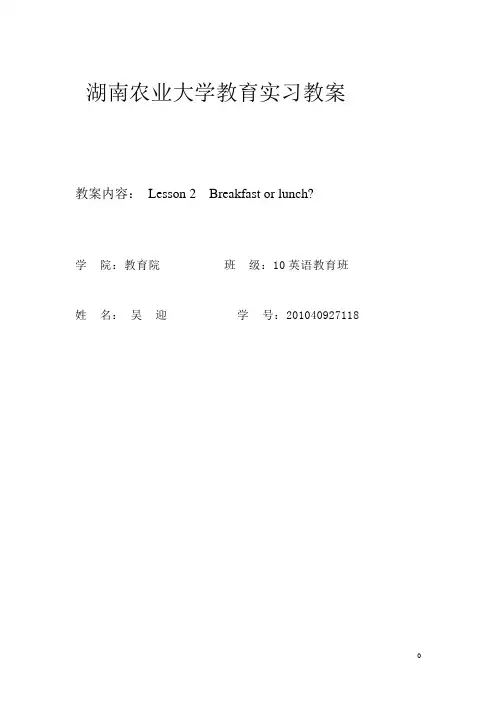
湖南农业大学教育实习教案教案内容:Lesson 2 Breakfast or lunch?学院:教育院班级:10英语教育班姓名:吴迎学号:201040927118Lesson 2 Breakfast or lunch?Teaching Aims and demands:1.Review the usage of Special Question.2.Master the usage of present continuous , and the word ―what‖.3.Grasp the following words and phrases:until, outside, ring, aunt, repeat, get up , stay, look out of, what a day, just then, by train, have breakfast,dear me.4.Learn a kind of word formation by adding affix —affixation5. Practice oral English with the topic ―A great breakfast I have at primary school/university‖.Teaching Content: Text ; Exercises (from Vocabulary to Writing)Teaching Key points and difficult points:1.the usage of present continuous.2.until, ring, repeat, get up, stay, look out of, just then, dear me.Teaching Periods: 6 periodsTeaching Procedures:Period 1-2:Ⅰ. Introduction to the text by asking some questions.Questions:1.Is it hard for you to get up early?2.Do you usually stay in bed very late?3.What time do you get up everyday?4.Do you usually have breakfast in lunchtime? Why?5.Do you remember your last brunch in school?6.Do you think it’s good for your health to have breakfast in lunchtime? Why?7.How do you usually make yourself have breakfast at the right time?8.Can you be an early bird for a month? ―Yes‖ or ― No‖?Ⅱ.Ask students to go through the text and finish the pre-class work to get the main idea of the text. Then analyze the text the general idea .Ⅲ. Explain the text in details.1. until prep. : up to the point in time or the event mentioned.e.g: Until she spoke I hadn’t realized she wasn’t English.You can stay on the bus until London (=until you reach London.)*from morning ~night.※ till (informal)1) conj./prep =untile.g. :Can’t you wait till we get home?2) n. the place were you pay for goods in a large shop/store.*a long queue at the tille.g. :Please pay at the till.3) v. (old use) to prepare and use land for growing crops.Usage Note:Till is generally felt to be more informal than until and is used much less often in writing. At the beginning of a sentence, until is usually used.2.outside1). adv. not in a room,building or container but on or to the outside of it. 在外面,向外面e.g. I’m seeing a patient ---please wait outside.It’s warm enough to eat outside.2) n. The outer side or surface of sth 外部e.g. I didn’t go into the temple---I only saw it from the outside.* At the ~ = at the moment = as a maximum* on the ~ :①Used to describe how sb appears or seemsOn the outside she seems calm, but I know she’s worried.②Not in prionLife on the outside took some getting used to again.3) adj./prep.She has a lot of outside interests (= not connected with her work)They fell cut off from the outside world.(=from other people and from other things that were happening) ~ chance of winning 胜算极小~of = apart frome.g. There was nothing they could do, outside of hoping things would get better.3.ring1) v. (rang, rung)~ sb. upI’ll ring you up later.~ sth. upShe rang up all the items on the till.~ for sth.Could you ring for a cab.~ (with sth.): to be full of a sound. 回想Applause rang through the hall.~ offHe rang off before I could explain.2) n.①give sb a ~: to make a telephone call to sb.E.g. I’ll give you a ring tomorrow.have a ~ of truth 真实可信E.g. His explanation has a ring of truth about it.②circleA key ~E.g. The children sat on the floor in a ring.③JewelleryE.g. A diamond glittered on her ring finger.4 .aunt : the sister of your father or mother; the wife of your uncle.E.g. My aunt lives in Canada.Auntie (= aunty ):Auntie Mary.5.repeat v.1) say/write again.To ~ a question.Do say if I’m repeating myself (=if I have already said this).He’s fond of repeating that the company’s success is all down to him.2) do againThey are hoping to repeat last year’s victory.To ~the class /year/grade(=in a school, to take the class/ year /grade again)重修这门课;重读一年;留级3)happen againHistory has a strange way of repeating itself.Repeatable adj. (usually in negative sentences)Repeated adj. (happening, said or done many times)~ absences from work.Repeatedly adv.E.g. The victim had been stabbed repeatedly in the chest.6 . get up: to stand up after sitting, lying, ect. ; to get out of bed.E.g. The class got up when the teacher came in.Could you get me up at 6:30 tomorrow.7.Stay1) stay in : to not go out or to remain indoorsE.g. I feel like staying in tonight.2)stay up : to go to bed later than usual.E.g. You’ve got school tomorrow. I don’t want you staying up late.3) stay away (from sb /sth): to not go near a particular person or place.E.g. I want you to stay away from my daughter.8.lookE.g. The teacher told us to look at the blackboard.That looks like an interesting film.Glance: take a quick look.E.g. She glanced at her watch during the talk.Gaze :a long steady look at sb/sth.E.g. She felt embarrassed under his steady gaze.Glare : a long angry look at sb/sth.E.g. The old woman glared at him9.Just then: at the momentE.g. Just then, someone knocked at the front door.Just then, my girlfriend drove up and gave me a ride.10.Dear me: used in expression that show that you are surprised, upset, annoyed or worried.E.g. Dear me! What a mess!Dear oh dear! What are you going to do now?11.What a day! =what a day it is ! =>elliptical sentenceE.g. This is a beautiful picture.= What a beautiful picture.She is careless. = How careless she is.12.I’m comeing to see you.Be +Ving +to : used to show that sth is likely to happen very soon or in the future.E.g. I think I’m going to faint.Look at these black clouds--- it is going to rain.15. Word formation-----affixationAdv. –ly(the suffix –ly ,from Middle English, is added to adjectives to form adverbs.)adj. Adv.repeated repeatedlylate latelyPeriod 3-4Ⅳ. Do some oral practice.1.Ask students to retell the story based on the following questions by using theexpressions in the text.Questions concerned:a. Does the writer always get up early on Sunday, or does he always get up late?b.Did he get up early last Sunday, or did he get up late?c.Who telephoned then?d. Had she just arrived by train, or had she come on foot?e.Did he say,’ I’m still having breakfast’, or did he say ,’ I am still in bed’?f.Was his aunt very surprised or not?g.What was the time?2.Topic: A great breakfast I have at primary school/universityExpressions for reference:(great,campus, delicious, roommates, cheap, etc.)(unforgettable, amusing, surprised, various, etc.)Ⅴ. WritingAsk students to write a summary about this text in not more than 55 words.Ⅵ. ConclusionAsk some students to read their summaries and evaluate the best one. Analyze the reasons why his/hers is the excellent.(talk about the skills)Period 5-6Ⅶ. Do some exercises in class and check the answers.1. When Aunt Lucy telephoned _____.A.the writer was asleep.B. the writer was still in bed.C. the writer had already got up.D. the writer was having lunch.2. Aunt Lucy was surprised because_____.A. the writer was having lunch.B. it was one o’clock.C. it was late.D.the writer was having breakfast at lunchtime.3. Write these sentences again. Each sentences must begin with what.a. This is a wonderful garden!b. This is a surprise!c. He is causing a lot of trouble.d. They are wonderful actors!e. She is a hare-working woman.f. You are a clever boy.4. Give the correct form of the words in parentheses.a. he is still _______(sleep).b. It (begin) to rain before she took a taxi.c. When all the guests had left, Derek (arrive).Ⅷ.Assignments :1. Structure& V ocabulary : P192. Writing: An unforgotten day in school.。
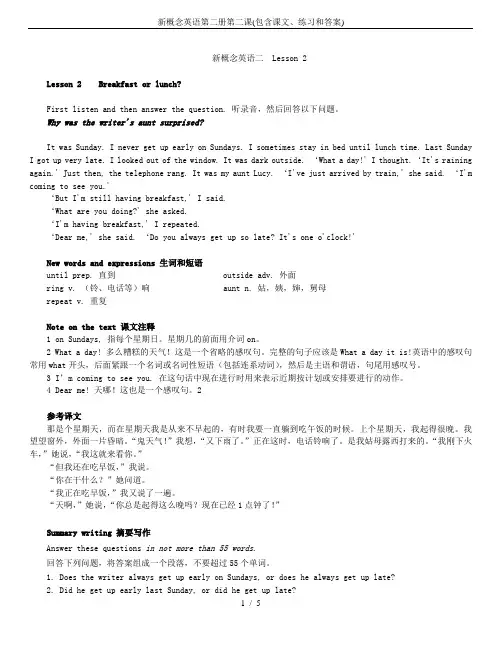
新概念英语二 Lesson 2Lesson 2 Breakfast or lunch?First listen and then answer the question. 听录音,然后回答以下问题。
Why was the writer's aunt surprised?It was Sunday. I never get up early on Sundays. I sometimes stay in bed until lunch time. Last Sunday I got up very late. I looked out of the window. It was dark outside. ‘What a day!' I thought.‘It's raining again.' Just then, the telephone rang. It was my aunt Lucy. ‘I've just arrived by train,' she said. ‘I'm coming to see you.'‘But I'm still having breakfast,' I said.‘What are you doing?' she asked.‘I'm having breakfast,' I repeated.‘Dear me,' she said. ‘Do you always get up so late? It's one o'clock!'New words and expressions 生词和短语until prep. 直到 outside adv. 外面ring v. (铃、电话等)响 aunt n. 姑,姨,婶,舅母repeat v. 重复Note on the text 课文注释1 on Sundays, 指每个星期日。
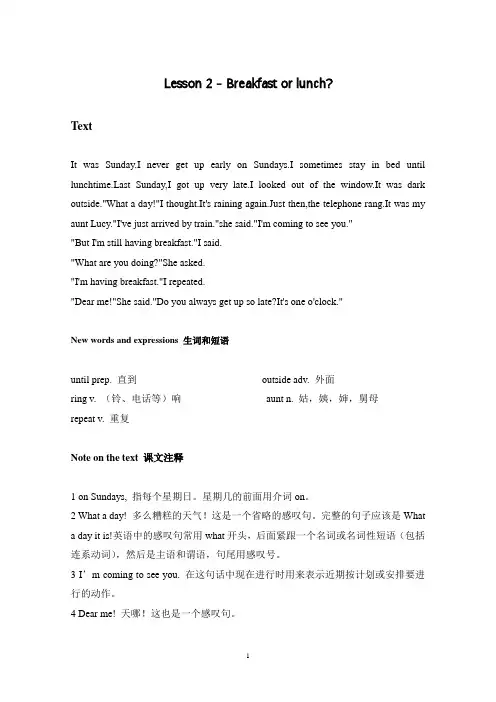
Lesson 2 - Breakfast or lunch?TextIt was Sunday.I never get up early on Sundays.I sometimes stay in bed until st Sunday,I got up very late.I looked out of the window.It was dark outside."What a day!"I thought.It's raining again.Just then,the telephone rang.It was my aunt Lucy."I've just arrived by train."she said."I'm coming to see you.""But I'm still having breakfast."I said."What are you doing?"She asked."I'm having breakfast."I repeated."Dear me!"She said."Do you always get up so late?It's one o'clock."New words and expressions 生词和短语until prep. 直到outside adv. 外面ring v. (铃、电话等)响aunt n. 姑,姨,婶,舅母repeat v. 重复Note on the text 课文注释1 on Sundays, 指每个星期日。
星期几的前面用介词on。
2 What a day! 多么糟糕的天气!这是一个省略的感叹句。
完整的句子应该是Whata day it is!英语中的感叹句常用what开头,后面紧跟一个名词或名词性短语(包括连系动词),然后是主语和谓语,句尾用感叹号。
新概念英语第二册课后练习题答案详解(第2课)新概念英语第二册课后习题Lesson 21. c因为根据课文内容,作者正在吃早饭,他不可能在床上。
所以a. 和b.与课文内容不符合,作者强调即使他起床很晚,已经是中午,但他还在吃早饭,所以d.也不对。
2. d因为只有d.才是Aunt Lucy 感到惊讶的原因,其他3个选择都不合乎逻辑。
3. c本句有一个表示经常性动作的时间状语sometimes,所以要用一般现在时。
因为主语是He, 所以它后面的动词要在词尾加s.a. stay 词尾没有加s;b. is staying 是实行时;d. staying是现在分词;只有c. stays符合时态和人称。
4. cgo to bed 是固定词组,意思是“就寝”。
a. in 能够用在stay in bed 之中;b. into 和 d. at 不符合语法和习惯用法,英语中不用into bed, at bed 这样的短语。
5. a只有a. late 是前一句中early的反义词,意思是“迟,晚”。
而 b. lately(最近), c. slowly(慢) , d. hardly(几乎不)都不是early的反义词。
6. b此问句的回答是By train ,是表示方式的,意思是乘火车来的。
只有b. How才能对句子中表示方式的部分实行提问。
而a. When是就时间提问的; c. Why是就原因提问的;d. where 是就地点提问的。
7. b如果填a. still句子不符合语法规则,也不符合逻辑; 选c. often 和 d. always 也不符合逻辑。
只有填b. now 句子才符合逻辑:他现在不能见他姑妈,因为他正在吃早饭。
8. a4个选择都有看的意思。
Look 的词意思是“看,望”强调看的动作,常和介词at, outof 等连用;See 的词意思是“看到,见到”强调结构,后面要带宾语;Watch的词意思是“观看,注视”多用来指看戏剧,电视节目等,是及物动词,如watch TV, watch a play;Remark 的词意思是“注意到,觉察到”也强调结果。
新概念英语教材第二册Lesson 1 A private conversation 私人谈话Last week I went to the theatre. I had a very good seat. The play was very interesting. I did not enjoy it. A young man and a young woman were sitting behind me. They were talking loudly. I got very angry. I could not hear the actors. I turned round. I looked at the man and the woman angrily. They did not pay any attention. In the end, I could not bear it. I turned round again. 'I can't hear a word!' I said angrily. ‘It’s none of your business,' the young man said rudely. 'This is a private conversation!'.上星期我去看戏。
我的座位很好,戏很有意思,但我却无法欣赏。
一青年男子与一青年女子坐在我的身后,大声地说着话。
我非常生气,因为我听不见演员在说什么。
我回过头去怒视着那一男一女,他们却毫不理会。
最后,我忍不住了,又一次回过头去,生气地说:“我一个字也听不见了!”“不关你的事,”那男的毫不客气地说,“这是私人间的谈话!”Lesson 2 Breakfast or lunch? 早餐还是午餐?It was Sunday. I never get up early on Sundays. I sometimes stay in bed until lunch time.Last Sunday I got up very late. I looked out of the window. It was dark outside.'What a day!' I thought. 'It's raining again.' Just then, the telephone rang. It was my aunt Lucy.' I've just arrived by train,' she said. 'I'm coming to see you.' 'But I'm still having breakfast,' I said.'What are you doing?' she asked. ‘I’m having breakfast,' I repeated.'Dear me,' she said. 'Do you always get up so late? It's one o'clock!''那是个星期天,而在星期天我是从来不早起的,有时我要一直躺到吃午饭的时候。
Lesson 2 Breakfast or lunch课文内容:It was Sunday.I never get up early on Sundays. I sometimes stay in bed until lunchtime. Last Sunday I got up very late.I looked out of the window. It was dark outside. "What a day!" I thought. "It's raining again." Just then, the telephone rang. It was my aunt Lucy. "I've just arrived by train," she said. "I'm coming to see you.""But I'm still having breakfast," I said."What are you doing?" she asked."I'm having breakfast," I repeated."Dear me," she said. "Do you always get up so late? It's one o'clock!"本文语法:频率副词语法归纳:表时间频率,位于句首或句尾,实义动词前,非实义动词后。
常用的频率副词有:always总是;sometimes有时;often常常;never从来不;ever曾经,永远;rarely很少;seldom很少;frequently经常;usually通常;regularly定期地精讲笔记:1、It was Sunday .I never get up early on Sundays .那是个星期天,我星期天从不早起的。